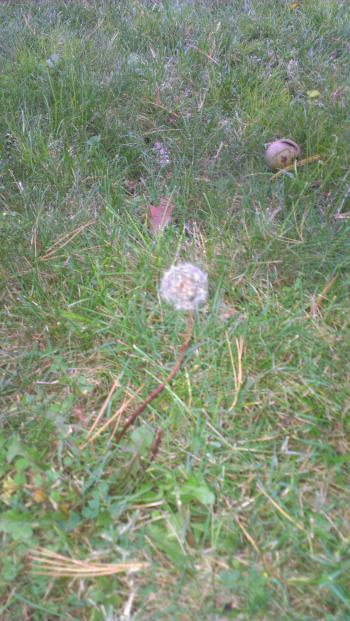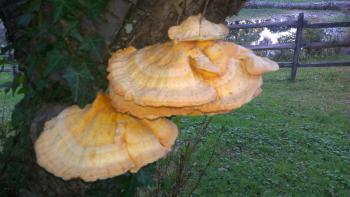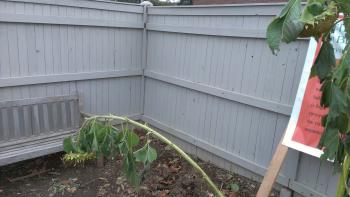Serendip is an independent site partnering with faculty at multiple colleges and universities around the world. Happy exploring!
Tension between vegetarian and meat-eaters
The book The Lives of Animals is ingeniously written and surprising compelling, although Coetzee used a lot of layers to “cover” his true feelings toward contemplation of animals.
Besides human’s cruelty toward animals, I see another “tension” in this book: the alienation between vegetarians and meat-eaters. In the books, the ageing mother’s ardent vegetarian conviction put a lot of tension on her son and her daughter-in-law. In some parts of the books, to me, it almost seemed like the mother and her meat-eating daughter-in-law had nothing in common to discuss about. However, at the end of the book, the son consoled the distraught mother, “There, there. It will be over soon.” Could it mean that the tension between the vegetarians and the meat-eaters will be over soon? As meat-eaters learn to respect animals more ardently, there will be a bridge that will connect in the gap between vegetarians and meat-eaters?

Narrative?
While reading The Lives of Animals, I thought to myself, "Well this is a let down. I thought this was going to be more of a novel. It's just a lot of little essays crammed into a book with a sham of a narrative to bookend them." However, having accepted this about the "novel", I began to see the genius of the author framing his argument in this way.
I see the son as neutral. He is in the middle of the extremes of his mother and his wife. Sure, he argues against them, but he does so as much with his mother as with his wife. This is why he is the narrarator. He should be likened to us, the persuadable. Then Coetzee spews many arguments at us, from many different sources. The constant debate makes the overall book very neutral. We should identify with whichever of the arguments makes the most sense to us.
Most of the arguments are based on reason, except for Elizabeth Costello's. So, while the narrative is a forum for all ideas (past the first lecture) to be debated, it also establishes that the emotional argument should be considered when we are making up our minds about what we think about the lives of animals.
Equating Characteristics to Equal Equality
In Coetzee's novel there seems to be the controversy over whether or not animals are on the same level as humans. Whether they have the same type of conscience as us or whether or not they think as we do. Elizabeth Costello seems to think that since we are all beings that we should be able to put ourselves into the thoughts of an animal and understand how it is thinking. This way we can understand where certain animals are coming from and how they think. I do not agree with this. How do we know that animals have a conscience that is simlar to ours? Couldn't they have a conscience except it is structured differently than our own? Are we as humans so closed to other possibilities that animals may in fact actually have a conscience that we just cannot understand. Just because we cannot prove something does not mean it was true. In Elizabeth Costello's speech she proposes that Descarte did not have sufficient information about Apes and Dolphins and was therefore only capable of making his assumptions based on what he had. In the future we may in fact prove that animals have a conscience adn can think, except they may just think differently than us. It is possible that we just haven't prgressed that far to prove it.

voice conversation about "play"
Last week we were talking a lot about "play" in class and this ended up seeping into another conversation in one of my other classes outside the 360 with Anne. Here's a link to that conversation if any is interested/wanted to further our conversations about the links between play and learning: /exchange/divergent-thinking#comment-139691
I think some of these comments are relevant to our voice discussion about what play means or does not mean!

animal cruelty?
So the Lives of Animals got me thinking about the wealth of animal videos available to watch on the internet. I admit, I'm definitely guilty of watching hours of back to back YouTube videos of cute puppies, kittens, hedgehogs, etc. I'm starting to wonder what the fascination is with cute things that struggle. I was watching this adorable bulldog puppy struggle to get off his back, I was struck by how many people where so delighted with how cute and funny this video seems. A few commenters called the owner out on it, calling it animal abuse. As I looked at the description, I noticed that the owner of the video had included a response to the angry comments, stating, "All bulldog puppies have to deal with this problem, they have to learn to get up on there own. If the owner helps them, they won't learn and the owner can't be there to help flip them over 24/7. It is a common thing you see when around any bulldog puppies. Due to their odd body shape, yes it is difficult for them to get up. Everyone seriously needs to calm down, the owner of the video was actually doing the right thing, and people will realize this if they think about it hard enough." While I see the reason why the bulldog puppy needs to learn how to get up on his own, is it really necessary for the puppy's efforts to be posted online for everyone to laugh at? I kept wondering if he was scared and suddenly watching the puppy turned from cute to agonizing.

Smoking on Bryn Mawr College's Campus: Representing the Power of Student Participation in the Student Government Association
My initial interest was the “rules” of Bryn Mawr Campus and ways in which students either resisted or followed these rules. I eventually narrowed my focus to smoking on campus, after coming across a series of correspondences through student publications in regards to Student Government Association’s involvement in determining the social regulations of students’ lives. More specifically, these “correspondences” focused on campus drinking and smoking amongst students. In the Spring of 1944, the Lantern, one of Bryn Mawr’s student literary magazines, issued an aggressive editorial calling upon the student’s radical abolition of the Student Government Association. Students who crafted this editorial were tired of staying “silent” when it came to rule breaking, writing that, “Rules are being broken. Those who find the rules unreasonable to maintain soon find that the risk of being caught is considerably reduced by discreet silence.” They claimed that Student’s obvious resistance to the rules was indicative of unfair policy and too-strict rules. Without restrictive policy governing their conduct, student would no longer have to remain silent or risk categorization as “rule-breakers.”
Field Notes, the bigger picture
Going into this field placement on Friday, I knew exactly what the problem was. Though I had been deterred from going into the classroom, I finally understoof why. These teachers were most probably amazing teachers, they were capable of engaging their classroom and using innovative tools to get their idea across. However, there was NO technology in the classes, but this was not a random occurrence. This was the result of hesitation from the teachers because of their lack of experience in the field of using computers. Therefore, I finalized a script and began my camtasia video on how to create a google calendar

Research on Nonviolent Direct Action as it Intersects with Race and Class at Bryn Mawr: A Narrative
On Saturday, the Earth Quaker Action Team (EQAT) organized a Day of Action made up of 16 different actions at PNC Banks across 6 sates in the region, part of their campaign agains PNC's investments in companies that practice mountaintop removal coal mining. Bryn Mawr College had a very large role in this event, as the Bryn Mawr Earth Justice League's action was one of the largest with over 25 people attending. In our own little group (EJL) it sometimes feels like we're the only ones on campus doing this kind of activism, that Bryn Mawr as an institution, in its propoganda about fostering desire to make a meaningful contribution to the world, does not inspire in us while we are in college. We get the sense that, for the majority of the campus, academia far outweighs activism in importance, and we can put time into making the world a better place once we've graduated.
Things I didn't post
A dandelion grew on my campus site- the lawn in front of carpenter library.

A huge mushroom the the tree near the pond.

This is a picture of the sunflowers planted in stduent garden right after the storm.

Beautiful scenary at Nantasket Beach Hull MA in the morning, tourists who were drowned by the view and early communtors who ignored the scenes.



